- Home
- Sue Grafton
A Is for Alibi Page 2
A Is for Alibi Read online
Page 2
2
Santa Teresa is a Southern California town of eighty thousand, artfully arranged between the Sierra Madres and the Pacific Ocean—a haven for the abject rich. The public buildings look like old Spanish missions, the private homes look like magazine illustrations, the palm trees are trimmed of unsightly brown fronds, and the marina is as perfect as a picture postcard with the blue-gray hills forming a backdrop and white boats bobbing in the sunlight. Most of the downtown area consists of two- and three-story structures of white stucco and red tile, with wide soft curves and trellises wound with gaudy maroon bougainvillea. Even the frame bungalows of the poor could hardly be called squalid.
The police department is located near the heart of town on a side street lined with cottages painted mint green with low stone walls and jacaranda trees dripping lavender blossoms. Winter in Southern California consists of an overcast and is heralded not by autumn but by fire. After the fire season come the mud slides. And then the status quo is restored and everything goes on as before. This was May.
After I dropped the roll of film off to be developed, I went into the Homicide Department to see Lieutenant Dolan. Con is in his late fifties with the aura of the unkempt: bags under his eyes, gray stubble or its illusion, a pouchy face, and hair that’s been coated with some kind of men’s product and combed across a shiny place on top. He looks like he would smell of Thunderbird and hang out under bridges throwing up on his own shoes. Which is not to say he isn’t very sharp. Con Dolan is a lot smarter than the average thief. He and killers run about neck and neck. He catches them most of the time and only occasionally guesses wrong. Few people can outthink him and I’m not sure why this is true, except that his powers of concentration are profound and his memory clear and pitiless. He knew why I was there and he motioned me back to his office without a word.
What Con Dolan calls an office would do for a secretary anywhere else. He doesn’t like being shut away and he doesn’t much care for privacy. He likes to conduct his business tipped back in his chair with his attention half-turned to what’s going on around him. He picks up a lot of information like that and it saves him needless talk with his men. He knows when his detectives come and go and he knows who’s been brought in for questioning and he knows when reports aren’t being done on time and why.
“What can I do for you?” he said, but his tone didn’t indicate any particular desire to help.
“I’d like to look at the files on Laurence Fife.”
He arched an eyebrow at me ever so slightly. “It’s against department policy. We’re not running a public library here.”
“I didn’t ask to take them out. I just want to look. You’ve let me do that before.”
“Once.”
“I’ve given you information more times than that and you know it,” I said. “Why hesitate on this?”
“That case is closed.”
“Then you shouldn’t have any objections. It’s hardly an invasion of anyone’s privacy.”
His smile then was slow and humorless and he tapped a pencil idly, loving, I imagined, the power to turn me down cold. “She killed him, Kinsey. That’s all there is to it.”
“You told her to get in touch with me. Why bother with it if you don’t have a doubt yourself?”
“My doubts have nothing to do with Laurence Fife,” he said.
“What then?”
“There’s more to this one than meets the eye,” he said evasively. “Maybe we’d like to protect what we’ve got.”
“Are ‘we’ keeping secrets?”
“Oh I got more secrets than you ever dreamed about,” he said.
“Me too,” I said. “Now why are we playing games?”
He gave me a look that might have been annoyance and might have been something else. He’s a hard man to read. “You know how I feel about people like you.”
“Look, as far as I’m concerned, we’re in the same business,” I said. “I’m straight with you. I don’t know what kind of gripes you have with the other private investigators in town, but I stay out of your way and I’ve got nothing but respect for the job you do. I don’t understand why we can’t cooperate with one another.”
He stared at me for a moment, his mouth turning down with resignation. “You’d get more out of me if you’d learn to flirt,” he said grudgingly.
“No I wouldn’t. You think women are a pain in the ass. If I flirted, you’d pat me on the head and make me go away.”
He wouldn’t take the bait on that one but he did reach over and pick up the phone, dialing Identification and Records.
“This is Dolan. Have Emerald bring me the files on Laurence Fife.” He hung up and leaned back again, looking at me with a mixture of speculation and distaste.
“I better not hear any complaints about the way you handle this. If I get one call from anyone—and I’m talking about a witness who feels harassed or anyone else, including my men or anybody else’s men—you’re up shit creek. You got that?”
I held up three fingers beside my temple dutifully. “Scout’s honor.”
“When were you ever a Scout?”
“Well, I was a Brownie once for almost a week,” I said sweetly. “We had to paint a rose on a hanky for Mother’s Day and I thought it was dumb so I quit.”
He didn’t smile. “You can use Lieutenant Becker’s office,” he said when the files arrived. “And stay out of trouble.”
I went into Becker’s office.
It took me two hours to sort through the mass of paperwork but I began to see why Con had been reluctant to let me look because just about the first thing that came to light was a series of Telexes from the West Los Angeles Police Department about a second homicide. At first, I thought it was a mistake—that communiqués from another case had been inadvertently sandwiched into the wrong file. But the details nearly leapt off the page and the implications made my heart go pitty-pat. An accountant named Libby Glass, Caucasian, female, age twenty-four, had died from ingesting ground oleander four days after Laurence Fife died. She had worked for Haycraft and McNiece, a business-management firm representing the interests of Laurence Fife’s law firm. Now what the hell was that about?
I flipped through copies of investigators’ reports, trying to piece together the story from terse departmental memorandums and penciled summations of telephone calls flying back and forth between the Santa Teresa and West Los Angeles police departments. One memo noted that the key to her apartment had been found on the key ring in Laurence Fife’s office desk drawer. A lengthy interview with her parents didn’t add anything. There was an interview with a surly sounding ex-boyfriend named Lyle Abernathy, who seemed convinced that she was romantically involved with a “certain unnamed Santa Teresa attorney,” but no one had pinned it down much beyond that. Still, the connection was ominous enough and it looked like Nikki Fife’s alleged jealous rage might have included the object of her husband’s philanderings as well as the man himself. Except that there wasn’t any proof.
I made notes, jotting down last-known addresses and telephone numbers for whatever good that might do after all these years, and then I pushed my chair back and went to the door. Con was talking to Lieutenant Becker but he must have known what I wanted because he excused himself, apparently satisfied that I hadn’t missed the point. I leaned on the doorframe, waiting. He took his sweet time ambling over.
“You want to tell me what that was about?”
His expression was bemused but there was an air of bitterness about it. “We couldn’t make it stick,” he said flatly.
“You think Nikki killed her too?”
“I’d be willing to bet on it,” he snapped.
“I take it the D.A. didn’t see it that way.”
He shrugged, shoving his hands in his pockets. “I can read the California Evidence Code as well as the next man. They called off my dogs.”
“The stuff in the file was all circumstantial,” I said.
“That’s right.”
I
shut my mouth, staring off at a row of windows that badly needed to be cleaned. I didn’t like this little turn of events at all and he seemed to know that. He shifted his weight.
“I think I could have nailed her but the D.A. was in a big hurry and he didn’t want to jeopardize his case. Bad politics. That’s why you didn’t like being a cop yourself, Kinsey. Working with a leash around your neck.”
“I still don’t like that,” I said.
“Maybe that’s why I’m helping you,” he said and the look in his eyes was shrewd.
“What about follow-up?”
“Oh we did that. We worked on the Libby Glass angle for months, off and on. So did the West LAPD. We never turned up anything. No witnesses. No informants. No fingerprints that could have placed Nikki Fife at the scene. We couldn’t even prove that Nikki knew Libby Glass.”
“You think I’m going to help you make your case?”
“Well, I don’t know about that,” he said. “You might. Believe it or not, I don’t think you’re a bad investigator. Young yet, and sometimes off the wall, but basically honest at any rate. If you turn up evidence that points to Nikki, I don’t think you’d hold that back now, would you?”
“If she did it.”
“If she didn’t, then you don’t have anything to worry about.”
“Con, if Nikki Fife has something to hide, why would she open this whole thing up again? She couldn’t be that kind of fool. What could she possibly gain?”
“You tell me.”
“Listen,” I said, “I don’t believe she killed Laurence in the first place so you’re going to have a hell of a time persuading me she killed someone else as well.”
The phone rang two desks over and Lieutenant Becker held up a finger, looking over at Con. He gave me a fleeting smile as he moved away.
“Have a good time,” he said.
I scanned the file again quickly to make sure I hadn’t overlooked anything and then I closed it up and left it on the desk. He was deep in conversation with Becker again when I passed the two of them and neither looked up at me. I was troubled by the idea of Libby Glass but I was also intrigued. Maybe this was going to be more than a rehash of old business, maybe there was more to be turned up than a trail that was eight years cold.
By the time I got back to the office, it was 4:15 and I needed a drink. I got a bottle of chablis out of my little refrigerator and applied the corkscrew. The two coffee mugs were still sitting on my desk. I rinsed out both and filled mine with wine tart enough to make me shudder ever so slightly. I went out onto the second-floor balcony and looked down at State Street, which runs right up the middle of downtown Santa Teresa, eventually making a big curve to the left and turning into a street with another name. Even where I stood, there were Spanish tile and stucco arches and bougainvillea growing everywhere. Santa Teresa is the only town I ever heard of that made the main street narrower, planted trees instead of pulling them up, and constructed cunning telephone booths that look like small confessionals. I propped myself up on the waist-high ledge and sipped my wine. I could smell the ocean and I let my mind go blank, watching the pedestrians down below. I already knew that I would go to work for Nikki but I needed just these few moments for myself before I turned my attention to the job to be done.
At 5:00 I went home, calling the service before I left.
Of all the places I’ve lived in Santa Teresa, my current cubbyhole is the best. It’s located on an unpretentious street that parallels the wide boulevard running along the beach. Most of the homes in the neighborhood are owned by retired folk whose memories of the town go back to the days when it was all citrus groves and resort hotels. My landlord, Henry Pitts, is a former commercial baker who makes a living now, at the age of eighty-one, by devising obnoxiously difficult crossword puzzles, which he likes to try out on me. He is usually also in the process of making mammoth batches of bread, which he leaves to rise in an old Shaker cradle on the sunporch near my room. Henry trades bread and other baked goods to a nearby restaurant for his meals and he has also, of late, become quite crafty about clipping coupons, declaring that on a good day he can buy $50.00 worth of groceries for $6.98. Somehow these shopping expeditions seem to net him pairs of panty hose, which he gives to me. I am halfway in love with Henry Pitts.
The room itself is fifteen feet square, outfitted as living room, bedroom, kitchen, bathroom, closet, and laundry facility. Originally this was Henry’s garage and I’m happy to say that it sports no stucco, red Spanish tile, or vines of any kind. It is made of aluminum siding and other wholly artificial products that are weather-resistant and never need paint. The architecture is completely nondescript. It is to this cozy den that I escape most days after work and it was from here that I called Nikki and asked her to meet me for a drink.
3
I do most of my hanging out in a neighborhood bar called Rosie’s. It’s the sort of place where you look to see if the chair needs brushing off before you sit down. The plastic seats have little rips in them that leave curls of nylon on the underside of your stockings and the tables have black Formica tops hand-etched with words like hi. To the left above the bar, there’s a dusty marlin, and when people get drunk, Rosie lets them shoot rubber-tipped arrows at it with a toy gun, thus averting aggressions that might otherwise erupt into vicious barroom snits.
The place appeals to me for a couple of reasons. Not only is it close to my home but it is never attractive to tourists, which means that most of the time it’s half-empty and perfect for private conversations. Then, too, Rosie’s cooking is inventive, a sort of devil-may-care cuisine with a Hungarian twist. It is with Rosie that Henry Pitts barters baked goods, so I get to eat his breads and pies as a dividend. Rosie is in her sixties with a nose that almost meets her upper lip, a low forehead, and hair dyed a remarkable shade of rust, rather like the color of cheap redwood furniture. She also does tricky things with an eyebrow pencil that makes her eyes look small and suspect.
When Nikki walked in that night, she hesitated, scanning the place. Then she spotted me and moved through the empty tables to the booth where I usually sit. She slid in across from me and eased out of her jacket. Rosie ambled over, eyeing Nikki with uneasiness. Rosie is convinced that I do business with Mafia types and drug crazies and she was probably trying to determine the category into which Nikki Fife might fit.
“So are you eating something or what?” Rosie said, getting straight to the point.
I glanced at Nikki. “Have you had dinner?”
She shook her head. Rosie’s eyes moved from Nikki to me as though I might be translating for a deaf-mute.
“What have you got tonight?”
“It’s veal porkolt. Veal cubes, lotta onion, paprika, and tomato paste. You’ll love it. You’ll go nuts. It’s the best kinda stew I make. Henry’s rolls and everything, and on a plate I’m gonna put some good soft cheese and a coupla gherkins.”
She was already writing the order down as she spoke, so it didn’t require much from us in the way of consent. “You gonna have wine too. I’ll pick the kind.”
When Rosie had left, I related the information I’d picked up in the files about the murder of Libby Glass, including the telephone calls that had been traced to Laurence’s home phone.
“Did you know about her?”
Nikki shook her head. “I heard the name but it was through my attorney, sometime during the trial, I think. I can’t even remember now what was said.”
“You never heard Laurence mention her? Never saw her name written down anyplace?”
“No little love notes if that’s what you mean. He was meticulous about that sort of thing. He was once named as corespondent in a divorce action because of some letters he wrote and after that, he seldom put anything personal in writing. I usually knew when he was involved with someone but never because he left cryptic notes or telephone numbers on matchbook covers or anything like that.”
I thought about that one for a minute. “What about phone bills though? Wh
y leave those around?”
“He didn’t,” Nikki said. “All the bills were sent to the business-management firm in Los Angeles.”
“And Libby Glass handled the account?”
“Apparently she did.”
“So maybe he called her on business matters.”
Nikki shrugged. She was a little less remote than she had been but I still had the feeling that she was one step removed from what was happening. “He was having an affair with someone.”
“How do you know?”
“The hours he kept. The look on his face.” She paused, apparently thinking back. “Sometimes he would smell of someone else’s soap. I finally accused him of that and afterwards he had a shower installed at the office and used the same kind of soap there that we used at home.”
“Did he see women down at the office?”
“Ask his partner,” she said with the faintest tinge of bitterness. “Maybe he even screwed ’em on the office couch, I don’t know. Anyway it was little things. It sounds stupid now, but once he came home and the edge of his sock was turned down. It was summer and he said he’d been out playing tennis. He had on tennis shorts and he’d worked up a sweat all right, but not out on a public court. I really zapped him that time.”
“But what would he say when you confronted him?”
“He’d admit it sometimes. Why not? I didn’t have any proof and adultery isn’t grounds for divorce in this state anyway.”
Rosie arrived with the wine and two paper napkins wrapped around some silverware. Nikki and I were both silent until she’d departed again.
“Why did you stay married to him if he was such a jerk?”
“Cowardice I guess,” she said. “I would have divorced him eventually, but I had a lot at stake.”
“Your son?”
“Yes.” Her chin came up slightly, whether from pride or defensiveness I wasn’t sure. “His name is Colin,” she said. “He’s twelve. I have him in a boarding school up near Monterey.”

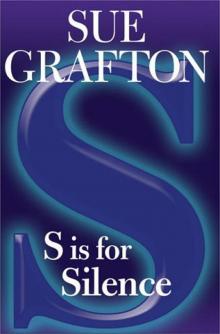 S Is for Silence
S Is for Silence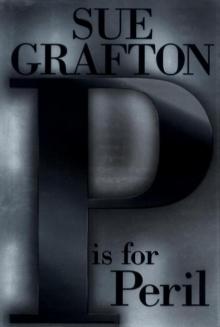 P Is for Peril
P Is for Peril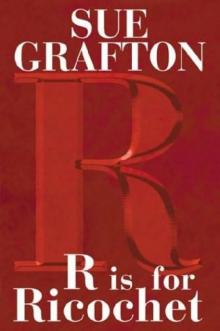 R Is for Ricochet
R Is for Ricochet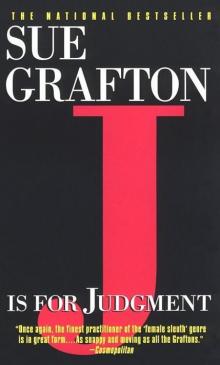 J Is for Judgment
J Is for Judgment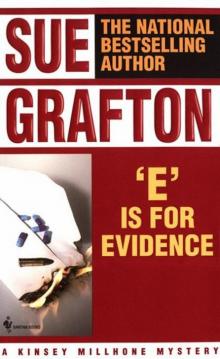 E Is for Evidence
E Is for Evidence T Is for Trespass
T Is for Trespass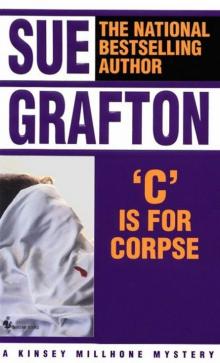 C Is for Corpse
C Is for Corpse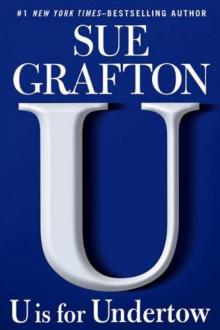 U Is for Undertow
U Is for Undertow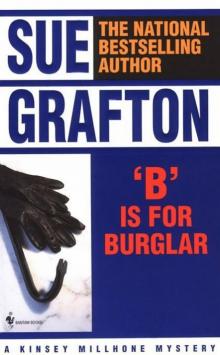 B Is for Burglar
B Is for Burglar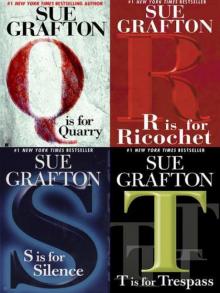 Four Sue Grafton Novels
Four Sue Grafton Novels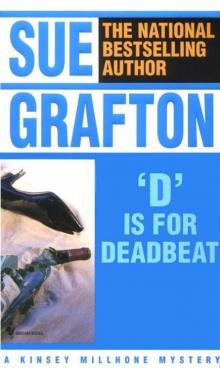 D Is for Deadbeat
D Is for Deadbeat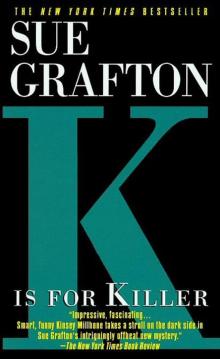 K Is for Killer
K Is for Killer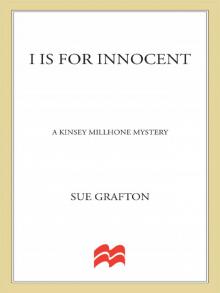 I Is for Innocent
I Is for Innocent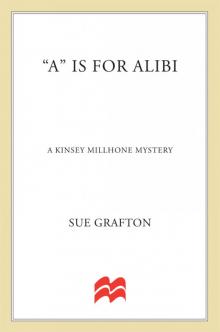 A Is for Alibi
A Is for Alibi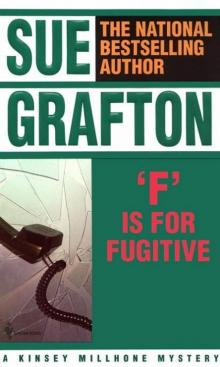 F Is for Fugitive
F Is for Fugitive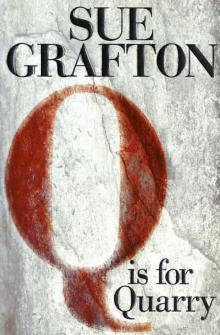 Q Is for Quarry
Q Is for Quarry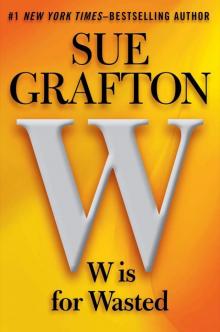 W Is for Wasted
W Is for Wasted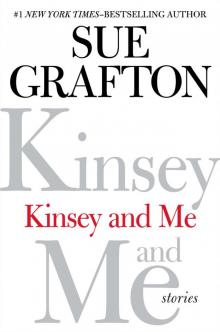 Kinsey and Me: Stories
Kinsey and Me: Stories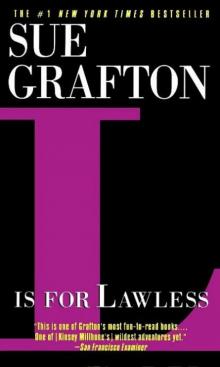 L Is for Lawless
L Is for Lawless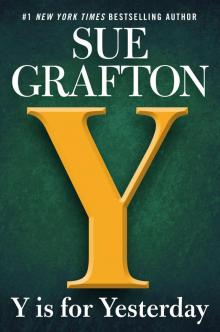 Y Is for Yesterday
Y Is for Yesterday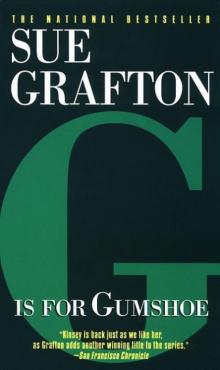 G Is for Gumshoe
G Is for Gumshoe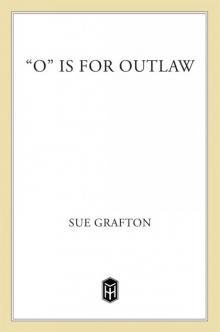 O Is for Outlaw
O Is for Outlaw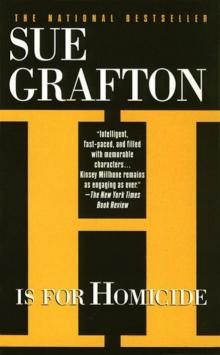 H Is for Homicide
H Is for Homicide X
X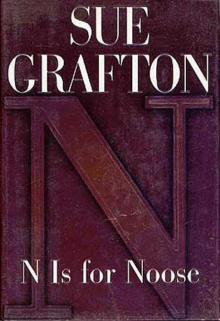 N Is for Noose
N Is for Noose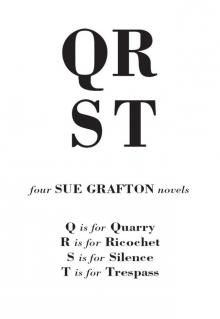 Three Complete Novels: A Is for Alibi / B Is for Burglar / C Is for Corpse
Three Complete Novels: A Is for Alibi / B Is for Burglar / C Is for Corpse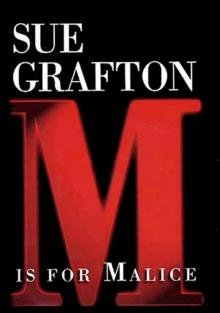 M Is for Malice
M Is for Malice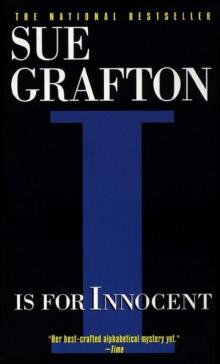 I is for INNOCENT
I is for INNOCENT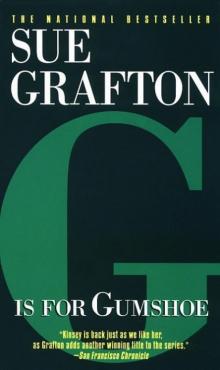 G is for GUMSHOE
G is for GUMSHOE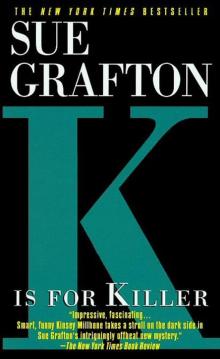 K is for KILLER
K is for KILLER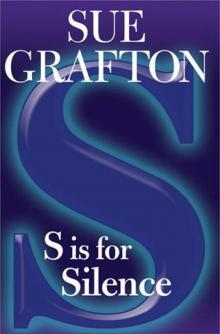 S is for SILENCE
S is for SILENCE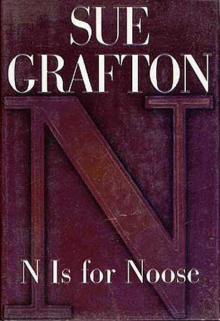 N is for NOOSE
N is for NOOSE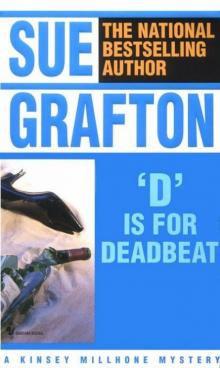 D is for DEADBEAT
D is for DEADBEAT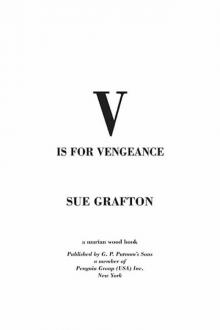 V is for Vengeance
V is for Vengeance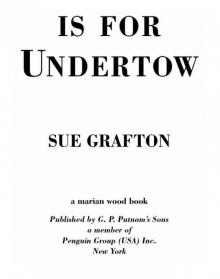 U is for Undertow
U is for Undertow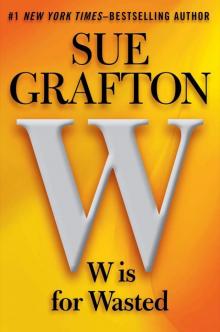 W Is for Wasted km-23
W Is for Wasted km-23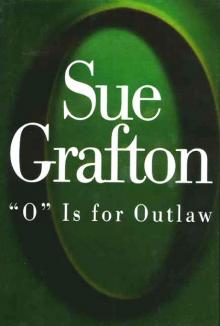 O is for OUTLAW
O is for OUTLAW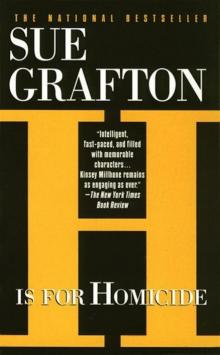 H is for HOMICIDE
H is for HOMICIDE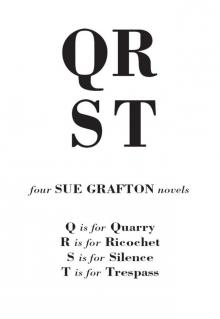 Sue Grafton Novel Collection
Sue Grafton Novel Collection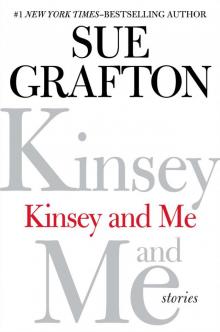 Kinsey and Me
Kinsey and Me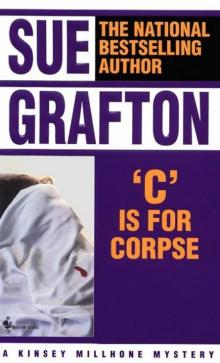 C is for CORPSE
C is for CORPSE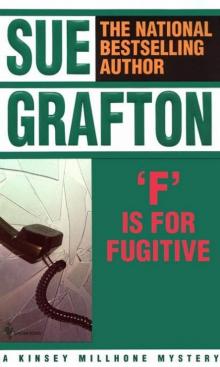 F is for FUGITIVE
F is for FUGITIVE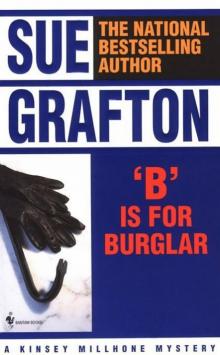 B is for BURGLAR
B is for BURGLAR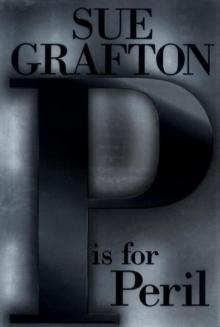 P is for PERIL
P is for PERIL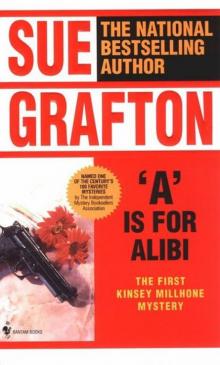 A is for ALIBI
A is for ALIBI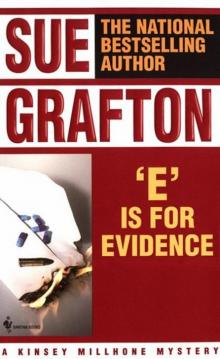 E is for EVIDENCE
E is for EVIDENCE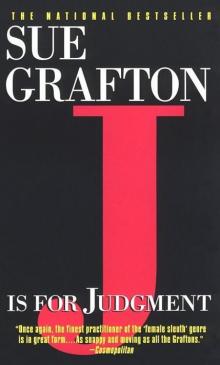 J is for JUDGMENT
J is for JUDGMENT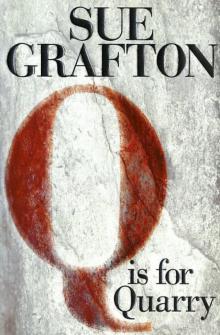 Q is for QUARRY
Q is for QUARRY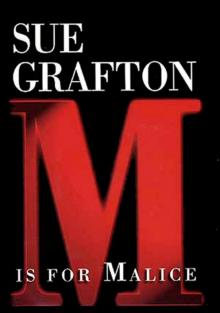 M is for MALICE
M is for MALICE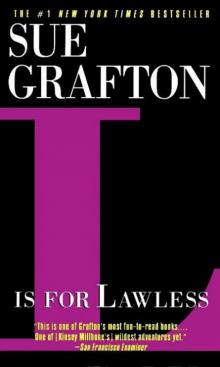 L is for LAWLESS
L is for LAWLESS